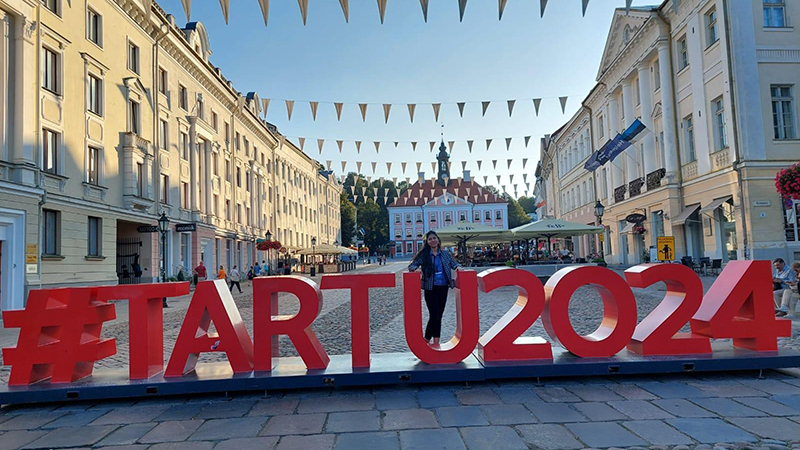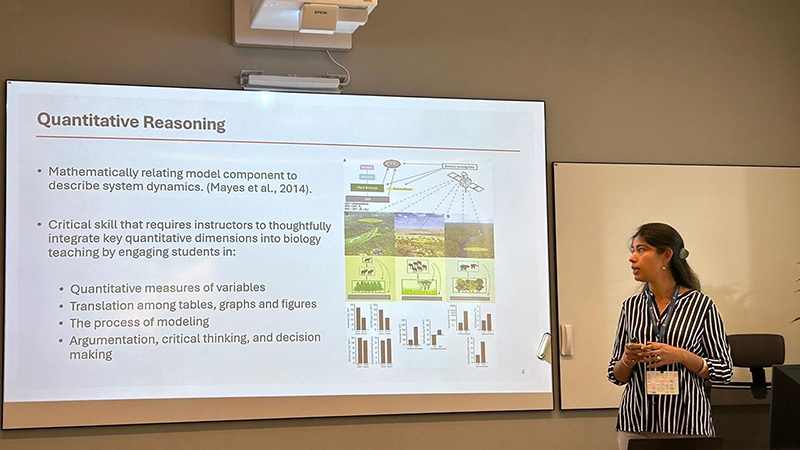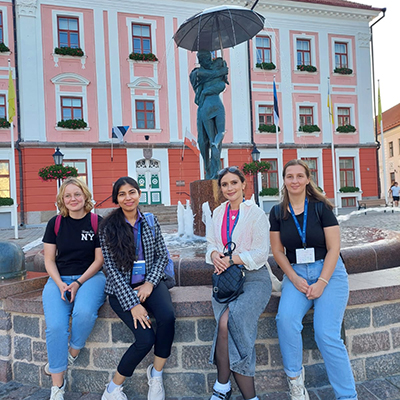Posted: 9/30/2024
Khushal gets scholarship to present biology research in Estonia

By Ronica Stromberg
Anum Khushal's research on using quantitative reasoning in undergraduate biology classes earned her a scholarship to present at a Northern European summer school August 19-24, 2024.
The fourth-year doctoral student from Pakistan has been analyzing interview responses of undergraduate biology instructors about the ways and reasons why, in their classes, they include quantitative reasoning, the use of math and information to solve problems in daily life.
Khushal has been working with professors Joe Dauer in the School of Natural Resources and Brian Couch in the School of Biological Sciences to determine not only how and why instructors are using quantitative reasoning in biology classes but also what this means for student learning.
She applied for the European Science Education Research Association summer school in Tartu, Estonia. The association typically selects 40 to 50 doctoral candidates, who have completed their coursework and comprehensive exam, for summer school. This year, the association chose 47 students from 18 countries, with three coming from the United States.
Khushal and one other student received the added honor of full-ride travel scholarships from the National Association for Research in Science Teaching.
"I felt it was an honor for me because I am not from the United States, being Pakistani," Khushal said. “I was representing the United States, and I was not only representing the United States, I was representing my university and my research group at that international platform."
At the summer school, she presented her research to seven other doctoral students and two experienced researchers in a small group before presenting to the whole group. She received constructive feedback, gave it to others and took part in workshops and discussions. She said her peers gave her good reviews on her data collection and analysis and her research mentors told her she chose a good topic to work on.

"They were very interested in this topic because the traditional thought is that biology is away from mathematics, and this is something new, like mathematics in biology," Khushal said.
Traditionally, biology has been thought of as a science field without math but, as technology and data have increased, Khushal said all disciplines, and specifically biology, need math. She cited calculating population growth rates and figuring out carbon and oxygen cycles as examples of areas in biology where math is needed.
At the summer school, she fleshed out an idea of how and why instructors use quantitative reasoning in class by looking at the different ways they teach the same topic, like population growth. She said she will look at the ways instructors assess students and the quantity of exercises or activities they give students to help them understand quantitative reasoning in biology topics.
Khushal said she would recommend the summer school to other science education students as a good way to polish their work and have intensified time with peers and experts. One of its greatest values, she said, was it helped her see that others are passing through the same stages she has been.
"Being an international student and working on my Ph.D., I feel like it's challenging, but seeing other people having similar kinds of struggles in their studies helped me develop a feeling that I'm not alone,” she said. “There are other students having the same troubles, and there are ways to make a way out of those challenges. And everyone passed through these stages, even the experienced researchers."
Since the summer school, she has had the option to stay in contact with the peers and experts she met through sharing documents in Google Drive, chatting through Whatsapp and emailing questions or asking for help.
She continues working toward the goal of earning her doctorate with the intention of continuing in academia or research afterward. She said she would like to help biology students recognize the necessity of math, overcome fears of it and grow comfortable with it.
"We cannot leave mathematics behind in any field, even in nonscience fields," she said. "We need mathematics for our analysis, for our data representation, for our evidence-based teaching."
